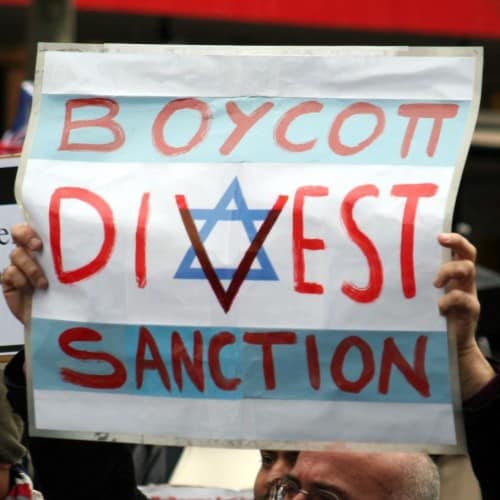A few months ago a fellow anthropologist colleague forwarded me a petition: Anthropologists for the Boycott of Israeli Academic Institutions. The main goal is to voice opposition to the ongoing Israeli violations of Palestinian human rights and to boycott Israeli academic institutions whose complicity into the systematic violation of Palestinian basic rights notoriously goes well beyond the passive acceptance of the status-quo. As a scholar who has spent over a decade carrying out research on and in the Palestinian refugee camps of Jordan, I have grown quite sympathetic with Palestinians’ struggle for national sovereignty. I have signed the petition; so have done nearly one thousand anthropologists among tenured and untenured scholars, graduate students, and post-doctoral fellows.
The petition is part of a larger campaign – Boycott, Divestment and Sanctions (BDS) – that started in 2004 in response to calls from Palestinian activists and academics.
The aim is to pressure Israel by means of various strategies that range from divestment and sanctions to consumer, cultural, and academic boycotts. The Palestinian Campaign for the Academic & Cultural Boycott of Israel (PACBI) issued a call in 2004 for the academic and cultural boycott of Israel. The boycott does not prevent individual Israeli academics from attending conferences or entering into research collaborations with the signatories of the statement call. It does bar however any organization and individual who have subscribed the call from collaborating on projects and events hosted or funded by Israeli academic institutions, from teaching or attending conferences or other events at such institutions, and from publishing in academic journals based in Israel. Collaboration with individual scholars based in the Israeli academy remains open.

Over the past months, the academic boycott of Israel has grown considerably in size and relevance. Many prestigious academic associations and institutions have subscribed the call.
In February 2014, for example, the members of the American Studies Association (ASA) National Council – the oldest and largest association devoted to the interdisciplinary study of American culture and history – have endorsed their participation in the boycott of Israeli academic institutions. Similarly, many other academic institutions and associations across the world have joined the call and expressed their support for the international boycott, divestment and sanctions (BDS) movement against Israel.
As expected the nature of the boycott has spurred harsh criticism and bitter debate in and outside the academia. The Israeli Anthropological Association recently sent a letter to the American Anthropological Association (AAA) calling any academic boycott of Israel “a moral insult to our integrity.” It says: “Punishing scholars in Israel for the acts of their government is not only meaningless, ineffectual and counterproductive, it is first and foremost a breach of academic freedom and freedom of speech.” Even Palestinian leader Mahmoud Abbas has supported a settlement boycott but opposed a boycott of Israel on the principle of a mutual recognition with Israel. For others, instead, the academic boycott seems a dangerous strategy. Noam Chomsky, for example, argues how academic boycott can backfire a become “a gift to Israeli hardliners and their American supporters”.

Against this background, should we take a position? I believe so. I actually deeply disagree with those who argue that taking a clear stance into the Israeli-Palestinian conflict is direct function of the duration of the conflict. Israel’s systematic violation of Palestinian basic human rights has clearly demonstrated that this is not the case. But behind many scholars’ reticence to support the call, there may be also something else than the mere unwillingness to do so for strategic and personal believes. The idea of an active, politically committed, and morally engaged personal involvement sounds to many academics as disturbing. In a seminal article appeared in 1995 in Current Anthropology, Nancy Scheper-Hughes remarks how“above and outside the political fray is where most anthropologists cautiously position themselves.” Scholars, especially anthropologists, have been afflicted by a haughty intellectual aloofness in the name of a cultural relativism that reads more and more as moral detachment. However, as experts who study how power, domination, and structural violence affect everyday life, anthropologists and social scientists should be in a good situation to condemn Israel’s assaults on Palestinian culture and society.
If we need to take a position, we might be tempted to wonder whether academic boycott is fair or if it makes any sense at all. I think it is both sound and fair. I hardly understand why academic boycott would infringe free exchange of ideas and individual freedom, as it is often accused to do.
The PACBI Guidelines for the International Academic Boycott of Israel are quite clear in that sense. The BDS movement “rejects on principle boycotts of individuals based on their identity (such as citizenship, race, gender, or religion) or opinion [unless] an individual is representing the state of Israel or a complicit Israeli institution. Mere affiliation of Israeli scholars to an Israeli academic institution is therefore not grounds for applying the boycott.” The boycott neither targets individuals nor academic freedom. It does target institutions, and individuals who act in official capacity, that are complicit in the occupation and oppression of Palestinians in Israel and in the Occupied Territories. Not only Israeli academic institutions have intimate connections with the military, security, and political establishments in Israel. More than that, they have actively contributed to strengthen Israel’s domination – for example through the Dahiya Doctrine, adopted by the Israeli military in its assaults on Lebanon in 2006 and on Gaza this summer.
In calling for this institutional boycott, academic boycott is a powerful, yet non-violent, tactic through which scholars can exert political and moral pressure on Israel to change its policies toward the Palestinians.
Featured image by Takver, CC BY-SA 2.0





